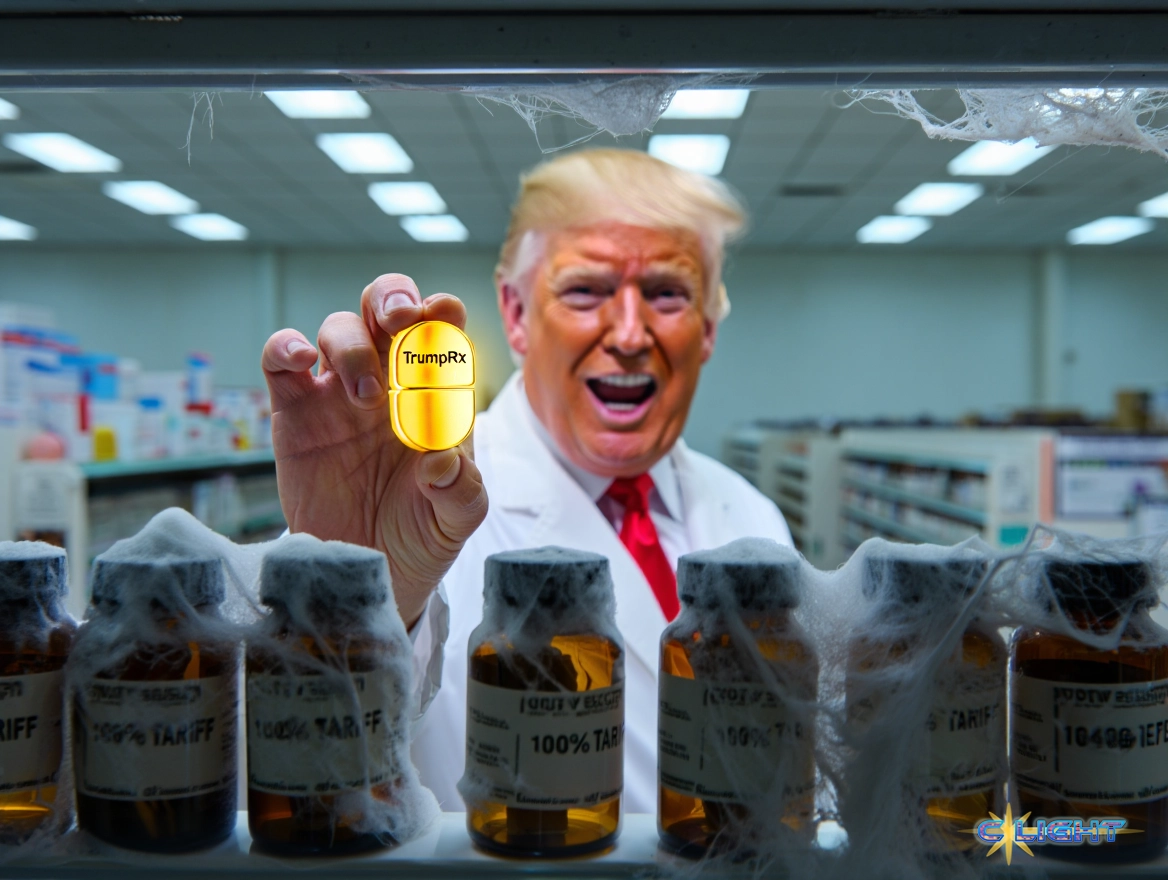4 minutes read time.
On the very day the U.S. government was set to shut down over a bitter dispute involving healthcare costs, President Felonious Punk staged a dramatic Oval Office ceremony to announce a supposed landmark victory over Big Pharma. The deal, struck with pharmaceutical giant Pfizer, and the promised launch of a new government website dubbed “TrumpRx,” were heralded by the President as a “really big announcement” that would end “global price gouging at the expense of American families”. However, a closer examination of the details reveals a plan that is not a prescription for lower drug costs, but a political placebo—a hollow gesture designed to create the appearance of action while providing little to no real relief for the vast majority of Americans.
The Illusion of a “Big Win”
The announcement was a pure political spectacle. Flanked by his top health officials and Pfizer’s CEO, the President declared that he was “turning the tide” on high drug prices. The core of the deal is a “voluntary” agreement from Pfizer to offer its drugs to Medicaid at a “Most Favored Nation” price, meaning the U.S. government would pay no more than the lowest price paid by other developed countries. This, combined with the future launch of the TrumpRx.gov website—a portal that would direct consumers to drugmakers’ own direct-to-consumer sales sites—was presented as a transformative victory for American patients.
Health Secretary Robert F. Kennedy Jr. praised Pfizer’s CEO for creating a “template for corporate responsibility”, and CMS Administrator Dr. Mehmet Oz suggested books would one day be written about the “all-night negotiations” that sealed the deal. The President himself spoke of impossible price decreases of “as much as 1,600 percent”. The message was clear: a great victory had been won.
The Fine Print: A Giveaway in Disguise
The reality, according to nearly every non-partisan health policy expert, is that the deal is little more than a public relations stunt that will do almost nothing to lower costs for the average person. The plan’s two main pillars crumble under the slightest scrutiny.
First, the focus on Medicaid is deeply misleading. Due to a system of legally mandated rebates, Medicaid already pays some of the lowest prices for prescription drugs in the United States. Furthermore, Medicaid patients themselves typically have very little or no out-of-pocket costs for their prescriptions. Therefore, any savings from this deal will likely accrue to state budgets, not to patients, and are expected to be minimal. As health policy professor Stacie Dusetzina noted, the deal is a “gimmick that only helps a very small number of people”.
Second, the TrumpRx website is designed to direct consumers to a sales model that is irrelevant for most Americans. The site will link to direct-to-consumer (DTC) platforms where patients must pay out-of-pocket, without using their insurance. While the “discounted” DTC price may be lower than the full cash price, for the vast majority of Americans who have insurance, their copay is almost always significantly cheaper. The website would mainly help the uninsured, a small fraction of the market. As one expert put it, the plan will have “little effect to no effect on drug prices for the vast majority of consumers”.
The most damning piece of evidence, however, comes from Wall Street. On the day of the announcement, Pfizer’s stock price surged by nearly 7%. Financial markets, which are ruthlessly efficient at sniffing out winners and losers, did not see this as a punitive deal that would harm Pfizer’s bottom line. They saw it for what it was: a massive win for a company that had successfully navigated a major political threat.

The Real Deal: Coercion for Compliance
So, if the deal doesn’t significantly help patients, why did Pfizer agree to it? The answer is coercion. This “voluntary” agreement was made under the direct threat of the President’s planned 100% tariff on imported pharmaceuticals, which was set to take effect this week. The deal with the White House grants Pfizer a three-year grace period from those potentially catastrophic tariffs in exchange for this manageable, PR-friendly concession on Medicaid pricing.
The President himself admitted this was the strategy, stating he had repeatedly threatened tariffs if companies didn’t comply. Pfizer’s CEO, Albert Bourla, even acknowledged at the press conference that the President’s tariff threat was “the most powerful tool to motivate behaviors”. This wasn’t a negotiation based on corporate responsibility; it was a shakedown. Pfizer chose the lesser of two evils, and Wall Street rewarded them for it.
The TrumpRx plan is not a serious attempt to lower drug costs. It is a masterclass in political theater. It allows the President to claim a populist victory over “Big Pharma” while actually giving a major pharmaceutical company a favorable deal that protects it from his more damaging trade policies. The “TrumpRx” name itself is the ultimate tell: the policy’s primary purpose is not to provide a prescription for high drug costs, but to boost the political fortunes of its namesake.
Discover more from Clight Morning Analysis
Subscribe to get the latest posts sent to your email.








